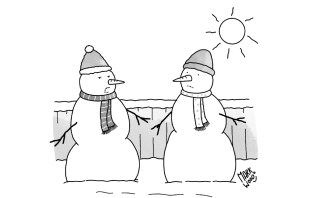
I was on the phone to a friend recently, who asked me what I was reviewing. ‘It’s a book by a lady intellectual,’ I began. ‘Oh my God,’ she said, ‘I hope you don’t put that in your review.’ ‘I’m not that stupid,’ I replied, ‘but it is very important that she’s a woman.’
A self-described radical feminist in the 1960s and 1970s, Vivian Gornick says that that flame has died down a bit now (she was 79 when this book was first published ten years ago). Her perspective in this meandering, delightful memoir-cum-essay is still, obviously, feminine – yet there is a kind of detachment; and from what she says about her past life, and her experiences with men, and with love, there always was, in a way. Hence the ‘odd’ in the title.
For all the ways in which Gornick is an unconventional human being, this book contains some of the best, most keen-sighted writing on love I have ever read – although, to be strictly accurate, she is writing more about what love isn’t, or how it isn’t what you want it to be. For example:
Sometimes I’d feel puzzled about how I would manage life both as an agent of revolution and as a devotee of love. Inevitably, then, a picture formed itself of me on the stage, my face glowing with purpose, and an adoring man in the audience waiting for me to come down into his arms. That seemed to cover all the bases.
Things didn’t pan out like this, but she can see the drily funny side a half a century on. Sometimes it takes that long.
Here she is about her mother:
I learned early that life was either Chekhovian or Shakespearean. In our house there was no contest. My mother lay on a couch in a half-darkened room, one arm flung across her forehead, the other pressed against her breast. ‘I’m lonely!’ she cried…
What I really want to do is quote large chunks like these, since they are self-explanatory and need no further comment. If I lived with someone, I’d be reading bits out to them until they left the room for some peace and quiet. ‘Listen to this, it’s amazing,’ I’d call to their retreating back.

The book is rich in anecdote, and dialogues with waspish friends, neighbours and people on the street. (Not the subway – you don’t do that in New York.) At one point, Gornick sits down in the queue at a drugstore next to a neighbour – ‘Vera, a Trotskyist from way back, who lives in a fourth-floor walk-up… and whose voice is always pitched at the level of soapbox urgency.’ (You picture her already.) They talk about Vera’s late husband: ‘ “One thing I gotta say,” says Vera, “he was a no-good husband but a great lover.”’ Gornick remarks: ‘I can feel a slight jolt in the body of the man sitting beside me.’ In that slight jolt, and her perception of it, is great comedy, and the book is full of it – of how a keen intelligence and situational awareness can only lead to laughter. Gornick is – as she puts it when talking about the conversations she had with a friend until they started irritating each other – ‘fed by the excitement of abstract thought joined to the concreteness of daily life’.
If I lived with someone, I’d be reading bits of this book out to them until they left the room for some peace and quiet
And that daily life has to be New York, for everything one needs is in it. Her view of the world is as confined as Saul Steinberg’s map of America: anything outside NYC might as well not be. This, in the end, is the most important thing about Gornick: that she’s a New Yorker. She’s so much of one that she barely considers the Bronx, where she grew up, to be part of the city. This is really a love letter to a place that saved her. She says of Samuel Johnson:
He hated and feared village life. The closed, silent streets threw him into despair. In the village his reflected presence was missing. Loneliness became unbearable. The meaning of the city is that it made the loneliness bearable.
That reflected presence means, I think, even the quick glances pedestrians give each other; or the fact that you can look out of the window and see hundreds and hundreds of lighted windows across the street.
Very rarely, the abstract thought becomes a little clotted. ‘New York friendships are an education between devotion to the melancholy and attraction to the expressive.’ That’s a lot of words ending in ‘-tion’ for a short sentence, but is it true, and true only for New York? After reflecting – that word again – I think it is. Read this book. It’s the next best thing to actually going to New York to visit a really clever friend.







Comments